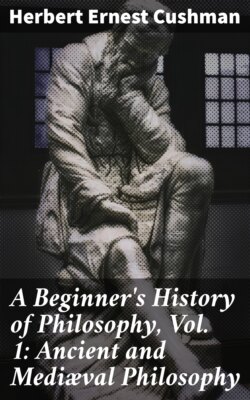A Beginner's History of Philosophy, Vol. 1: Ancient and Mediæval Philosophy

Реклама. ООО «ЛитРес», ИНН: 7719571260.
Оглавление
Herbert Ernest Cushman. A Beginner's History of Philosophy, Vol. 1: Ancient and Mediæval Philosophy
A Beginner's History of Philosophy, Vol. 1: Ancient and Mediæval Philosophy
Table of Contents
PREFACE
PREFACE TO THE REVISED EDITION
ILLUSTRATIONS
INTRODUCTION. THE THREE GENERAL PERIODS OF THE HISTORY OF PHILOSOPHY
CHAPTER I. THE EARLY GREEK IN ANCIENT PHILOSOPHY
CHAPTER II. THE COSMOLOGICAL PERIOD (625–480 B. C.): THE PHILOSOPHY OFNATURE
CHAPTER III. PLURALISM
CHAPTER IV. THE ANTHROPOLOGICAL PERIOD (490–399B.C.): THE PHILOSOPHY OFMAN
CHAPTER V. SOCRATES (469–399 B.C.)
CHAPTER VI. THE SYSTEMATIC PERIOD (399 B. C.–322 B. C.)
CHAPTER VII. PLATO (427–347 B.C.)
CHAPTER VIII. ARISTOTLE (384–322 B.C.)
CHAPTER IX. THE HELLENIC-ROMAN PERIOD (322 B. C.–476 A. D.)
CHAPTER X. EPICUREANISM
CHAPTER XI. STOICISM
CHAPTER XII. SKEPTICISM AND ECLECTICISM
CHAPTER XIII. THE RELIGIOUS PERIOD (100 B.C.–476 A.D.)
CHAPTER XIV. PATRISTICS.—THE HELLENIZING OF THE GOSPEL
CHAPTER XV. CHARACTERISTICS AND CONDITIONS OF THE MIDDLEAGES
CHAPTER XVI. THE EARLY PERIOD OF THE MIDDLE AGES (476–1000)
CHAPTER XVII. THE TRANSITIONAL PERIOD (1000–1200)
CHAPTER XVIII. THE PERIOD OF CLASSIC SCHOLASTICISM (1200–1453)
INDEX
Footnotes
Отрывок из книги
Herbert Ernest Cushman
Published by Good Press, 2021
.....
The Milesian Philosophy. The Milesians lived upon the seacoast, and the changes of the sea and air must have deeply impressed them. They had an intellectual curiosity to find the cosmic matter which remained identical with itself and at the same time moved. (See p.22.) They were not, therefore, interested to discover the chemical composition of matter, but to find what matter was most moving and therefore most alive. Thales said that it was water; Anaximenes, air; and Anaximander, the Apeiron, or the Unlimited. Their respective choices were determined by what seemed to possess the most mobility and the greatest inner vitality. Thales thought water possessed this quality. Water is always moving. Thales saw it moving. It therefore has life in itself. Anaximander felt that no object in our perceptual experience would fully explain the ceaseless mobility of nature, and he called it the Unlimited or the Indeterminate—the Apeiron. It is a mixture in which all qualities are lost. The changes in nature are endless, and therefore the single cosmic substance, from which they come, must be endless as well, for “from whatever source things come, in that they have their end.” We learn that this is just the reason for Anaximenes choosing the air for the single underlying cosmic substance. The air is the most changeable thing and is Unlimited.9
Both Thales and Anaximenes still held to the traditional polytheism of the Greek Epic. Anaximander rises above them in this respect. This conception of the Unlimited, to which his scientific search led him, is regarded by him as Deity. He calls it “the divine” (τὸ θεῖον); although he speaks of it in the neuter gender it is, nevertheless, the first European philosophical conception of God. It is the first attempt to conceive of God as purely physical and yet without any mythical dress. In Anaximander the Milesian monism has a religious aspect.
.....